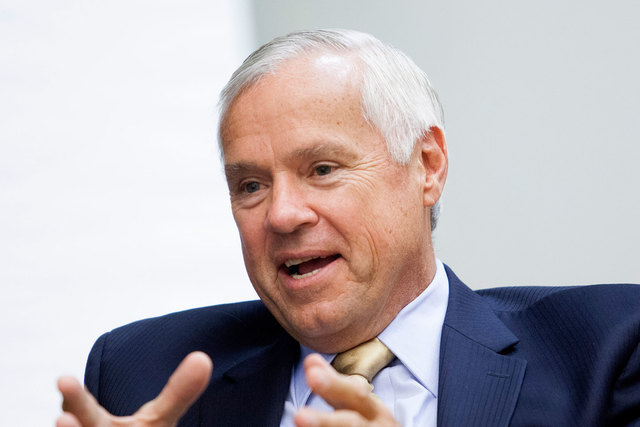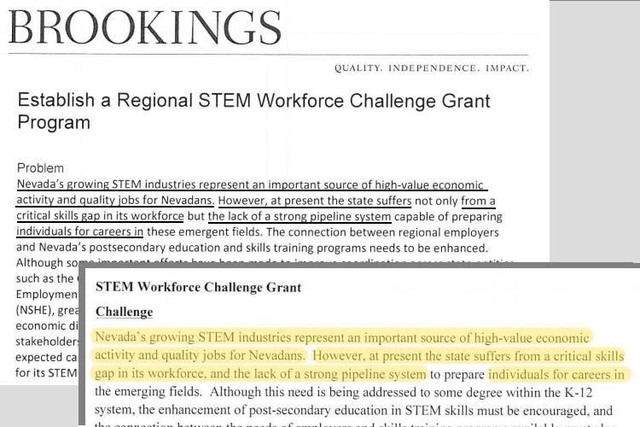Chancellor defends Nevada higher ed against plagiarism allegations


In the wake of plagiarism allegations, the chancellor of the Nevada System of Higher Education is rolling out a revised explanation.
But this explanation, like the initial one, is contradicted by emails and researchers at Brookings Mountain West, the think tank that the state agency is accused of plagiarizing.
Documents show the Nevada System of Higher Education copied large sections word-for-word of a Brookings Mountain West report draft in creating a competitive grant. Brookings Mountain West is a partnership between UNLV and the public policy nonprofit Brookings Institution in Washington, D.C.
Chancellor Dan Klaich emailed the Board of Regents after a Review-Journal story on the issue, telling members that Mark Muro, Washington director of Brookings Mountain West and lead author of the Brookings report in question, agreed to let the agency use the report and asked them to “fuzz it up and not share the paper.” Klaich wrote his agency only erred in not “fuzzing it up” enough.
Klaich goes on to explain that Muro was happy the agency liked the idea and requested attribution, which the agency added.
Emails obtained by the Review-Journal indicate otherwise.
As recently as September, Muro was emailing Klaich frustrated with the chancellor’s actions.
“As you know, I was disconcerted this summer when that early sketch I had shared with you and DETR on a confidential basis turned up, without attribution, in the very public college governance commission deliberations and was adopted in that early form. Seeing as I had shared early work with an eye to trying a concept out on you, I was frustrated to see that work suddenly wind up in public long before it was fully baked — and with no attribution until I asked for it. Maybe I was not formal enough about ground rules. But one result has been that some stakeholders think our work is derived from NSHE! That’s awkward for me, Brookings, and Brookings Mountain West and it certainly makes me feel burnt in trying to engage in substantive pre-publication dialogue.”
Brookings had shared a copy of an unfinished report to create a multimillion-dollar grant program designed to to improve the workforce in “STEM” industries: science, technology, engineering and math. The draft was labeled “do not circulate” and went to a variety of people, including Klaich, viewed as stakeholders for comment. Sharing confidential early drafts is a common way to vet research.
When asked about the contradictory emails, Klaich said he hadn’t read through all of his emails. Klaich maintained he had permission to use the report and that it was understood that his agency wanted to move quickly to get placeholder language in front of an interim legislative committee.
Klaich pointed to quotes from his emails with Muro, but would not provide the full email.
The Review-Journal has put in a public records requested for all emails between Klaich and Muro dating back to January.
Klaich said he would turn over that email when the Review-Journal’s entire request was finished, not before.
Klaich’s defense of the plagiarism allegation appalled and embarrassed Robert Lang, who as director of Brookings Mountain West published and funded the report and would have needed to approve any use of it. Lang said he commissioned Muro to write the report.
“It’s not Brookings Mountain West policy to send underdeveloped and half-baked ideas to state agencies and ask that they blur or fuzz up the findings,” Lang said. “That is hardly the making of good public policy and would not reflect well on Brookings Mountain West or UNLV.”
At Tuesday’s state board of regents meeting Regent Ron Knecht asked for a report on the allegation so that the people who were “falsely accused” could be exonerated. He said during the meeting he expected this would reflect badly on Brookings.
Brookings Mountain West estimates it spent $200,000 on its overall proposal.
Contact Bethany Barnes at bbarnes@reviewjournal.com or 702-477-3861. Find her on Twitter: @betsbarnes.












